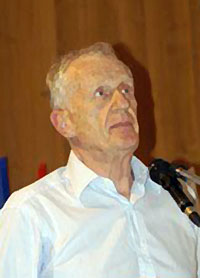|
Prof. Luigi Zanzi - Italy |
|
|
|
LIFE
THOUGHT
For an individual “eco-ethics” of responsibility beyond the horizon of intentions Among the multiple issues that arise when confronting the reflection on ethics in today’s world, when revising the new requests that history proposes in order to reflect on man and his environmental roots, there is that which refers to the specific “strategic” aspects of moral behaviour. It is also retained that, at individual level, ethics is rooted in a kind of “inspiration” that intuitively guides man in his choices of actions through multiple attempts to understand in different ways what one learns to comprehend as “that which is good”. From such consideration, the “strategic” aspect that mainly refers to the fact that no action can realise its own project without considering its interaction with the world in which it takes place is often left out. The attention to the “strategic” aspects of ethics implies a reflection of that which, in the tradition of Western thought, has been defined as “morality of intention” (as opposed to “morality of responsability”, as in Max Weber). In such tradition of thought, the “morality” of responsibility is considered that of political behaviour which reaches beyond the “intentional” consideration of connections between one man and another and implies the considerations of the complex context of behaviour, underlining the effects that “go beyond intentions” and which depend on links of determination that are not the effect of the will of an individual nor his or her good intentions. We therefore usually retain that the morality that takes into account the effects of an action that go beyond intention be the task of those with political roles in our society. Such positions should be seriously revised, claiming that in individual morality, as in the choices taken in the most immediate and free game of intuitive inspiration towards that which is good and that which is closest, we can assume a strategic behaviour that takes each individual gesture towards a choice of responsability, including the effects of such gesture which go beyond intention. Such ‘strategic’ attention to be also given to the morality of responsability at individual level should begin with a consideration of the roots and the “environmental” conditions of one’s own daily conduct. We can once again propose to the individual morality the task of educating ourselves in the “art” of our own conduct capable of having all “post effects” of our own actions, including those uncontrolled by our intention, find - in the environmental context - a link, a measure, a formality of expression that avoids being translated into opposing results contrary to those intentionally desired. If each individual directs his or her own intentional morality with such “strategic” attention, he or she therefore becomes “responsible” for the construction of an “eco-history” in which transforming moral intentions of individuals into a conduct that draws effects opposed to one’s own intention is avoided, thus avoiding the risk of transforming individual ethical choices into conflicting fronts. Such individual ethics of responsibility through such “strategic”art is the sole ethics capable of seriously and resposibly taking charge of the construction of peace through peace itself (such is the only constructive way to attain peace, as taught by Ghandi and later Martin Luther King, and taught in the present time by Lama Gangchen Rinpoche). It is only thus that a society can be built whose political vortix is made up of men capable of an ethics of responsibility.
|
